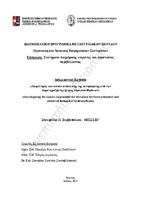Διερεύνηση των αιτιών απόκλισης της εκτιμώμενης από την παρατηρούμενη ζήτηση υδρογονανθράκων
Investigating the causes responsible for deviation between estimated and observed demand of hydrocarbons

Προβολή/
Θεματική επικεφαλίδα
Υδρογονάνθρακες ; Hydrocarbons ; Ενεργειακή πολιτική ; Energy policy ; Πετρέλαιο -- Βιομηχανία και εμπόριο ; Petroleum industry and tradeΠερίληψη
Στην παρούσα διπλωματική εργασία παρουσιάζεται ενδελεχώς η βιβλιογραφική
ανασκόπηση σχετικά με τους υδρογονάνθρακες και κυρίως του αργού πετρελαίου και
του φυσικού αερίου. Επιπλέον γίνεται εκτενής ιστορική αναδρομή στην τιμή του
αργού πετρελαίου και στις επιπτώσεις της αυξομείωσης της τιμής του στη σχέση της
προσφοράς και της ζήτησης, ενώ παρουσιάζονται οι παράγοντες που επηρεάζουν την
τιμή του αργού πετρελαίου. Επιπρόσθετα παρουσιάζεται μια εκτενής ανάλυση των ανανεώσιμων πηγών ενέργειας
καθώς και του σχετικού πολιτικού πλαισίου (Λευκή Βίβλος, Πρωτόκολλο του Κιότο).
Στη συνέχεια γίνεται λόγος για τα αποθέματα πετρελαίου, το λόγο αποθεμάτων προς
παραγωγή, την παραγωγή και την κατανάλωση του πετρελαίου καθώς και τις
σχετικές προβλέψεις έως το 2040 (σύμφωνα με την Αμερικανική Υπηρεσία
Ενεργειακών Υπηρεσιών), τόσο παγκοσμίως, όσο και για ορισμένες περιοχές
(Η.Π.Α., Σαουδική Αραβία, Κίνα και Ρωσία). Το κύριο θέμα της διπλωματικής εργασίας βασίζεται στη θεωρία περί κορύφωσης της
παραγωγής πετρελαίου (peak oil theory) και στις απόψεις οικονομολόγων και
περιβαλλοντολόγων για την εξάντληση των υδρογονανθράκων. Η αναφορά της
Λέσχης της Ρώμης «Τα όρια της ανάπτυξης» αποτέλεσε βασικό παράγοντα στη
δεκαετία του ´70 στην κατανόηση ότι οι πόροι είναι πεπερασμένοι και ότι η
ανθρωπότητα πρέπει να αναθεωρήσει τη στάση της απέναντι στην αλόγιστη
κατανάλωση συμβατικών πηγών ενέργειας και να στραφεί στις ανανεώσιμες πηγές
ενέργειας. Τέλος, εφαρμόστηκε το μοντέλο του Hubbert για την πρόβλεψη της πετρελαϊκής
παραγωγής, αλλά και της παραγωγής φυσικού αερίου σε ορισμένες χώρες αλλά και
σε ορισμένες πολιτείες των Η.Π.Α.. Σύμφωνα με τα αποτελέσματα, το μοντέλο
υπακούει στην απαγωγική/παραγωγική λογική, δηλαδή είναι ένα ορθολογιστικό
υπόδειγμα αδράνειας (inertia model) και δεν μπορεί να εφαρμοστεί παντού διότι δε
λαμβάνει υπόψη άλλους παράγοντες π.χ. την αύξηση των τιμών του πετρελαίου.


